Printers | ||
| ||
Printer List
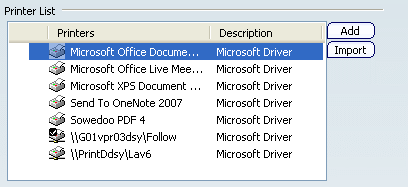
Provides a list of directories that will be used to store the configuration files of your 3D PLM printers. You can add your own directories and also protect or not the access to the desired directories when logged as administrator.
You can also add new Windows or 3D PLM printers.
3D PLM Printer configuration files are stored in permanent setting files which are located in:
C:\Documents and Settings\user\Application Data\Dassault Systemes\CATSettings\Rn\Authoring
(where "n" is the current release number).
These files are:
- CATPrintersSettings.CATSettings (contains the list of printers defined in the Printer List).
- Print.CATSettings (contains information about the default printer, the default CATPrintParameters, and the name of the plug-in that has been implemented, if any).
![]()
Adding a Printer
To add a printer to the list, click Add; this opens the
Add Printer Wizard which lets you choose the type of printer
to be added:
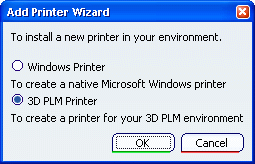
For more information, see Infrastructure User's Guide: Printing Objects: Setting Up Printers: Adding a Printer.
![]()
Configuring a Printer
The Configure contextual command lets you reconfigure an existing printer.
To do so, right-click the printer to be reconfigured then select Configure (or double-click the printer name).
For more information, see Infrastructure User's Guide: Printing Objects: Setting Up Printers: Configuring a Printer .
![]()
Setting the Default Printer
The Set As Default contextual command lets you reconfigure an existing printer.
To do so, right-click the printer to be reconfigured then select
Set As Default: the default
printer is identified by the icon ![]() .
.
However, note that:
- The default printer is modified when you select a different printer in the Print dialog box.
- When you restart a new session, the default printer is the one defined in .
![]()
Removing a Printer
The Remove contextual command lets you reconfigure an existing printer.
To do so, right-click the printer to be reconfigured then select Remove: the printer is removed from the CATPrintersSettings.CATSettings file.
Note that you cannot remove Windows printers.
![]()
Testing a Printer
The Test contextual command lets you reconfigure an existing printer.
To do so, right-click the printer to be reconfigured then select Test: the test page is printed.
![]()
Changing the Lock Status
When logged as administrator, you can protect the access to 3D PLM printers.
To do so, double-click the lock symbol next to the 3D PLM printer to be protected, or right-click the 3D PLM printer from the list then select Change Lock Status.
When a printer is locked, the end user can neither remove it, nor change its lock status. The lock symbol is updated accordingly to reflect the lock status:
- Printer000 is not locked:
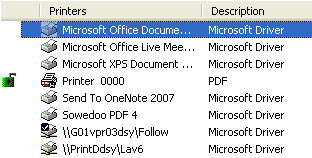
- Printer000 is locked by the administrator. The result is as follows in administration mode:
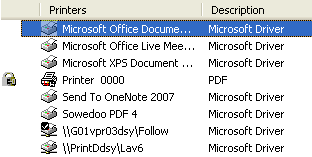
- The end user inherits the settings:
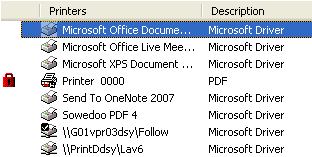
![]()
Exporting a Printer
Lets you export a printer to an XML file. To do so:
- Right-click the printer of your choice.
- Select Export.
- In the Export File dialog box, navigate to the directory of your choice.
- Click Save.
![]()
Importing a Printer
Lets you import a printer from an XML file. To do so:
- Click Import.
- In the Import File dialog box, browse your file tree to the file of your choice.
- Click Open to add the printer to the list.
| Warning: If the name of the printer to be imported already exists, a warning message is displayed and prompts you to confirm the overwriting. |
![]()
Driver Configuration Path

Lets you customize the path to external drivers that may have been defined with CAA V6 APIs. This option is relevant when working in a CAA environment only.
Enter the path to the configuration file where your driver settings are
stored or click the
![]() button
to navigate to the desired location.
This file is identified by the suffix *.cfg.
button
to navigate to the desired location.
This file is identified by the suffix *.cfg.
By default, the external driver configuration file is stored in:
- $HOME/CATSettings/Printers/Drivers.cfg.
where "$HOME" represents the CATUserSettingPath variable.
If no path is specified, the box displays ${CATUserSettingPath}\Printers\Drivers.cfg to indicate that the default location is used.
![]()
Printer Group Definition
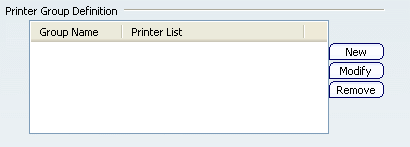
Lets you define, modify and delete groups of printers. These groups then enables you to filter the printers displayed in the Print dialog box and therefore, select the desired printer more easily.
In the Print dialog box, General is the default value and displays all the printers set up by your administrator.
| Important: The printer groups you define in this tab are saved in the Printers.CATSettings file (stored in the CATSettings directory). |
-
Click the New button to open the Printer Group dialog box:
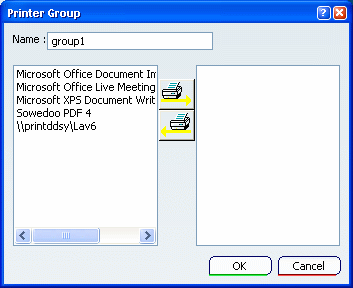
The left column displays the printers that have already been set up. The group name is displayed in the Name box and can be modified if needed. The group number is incremented for each new group you create.
In the left column, select the printers to be added to the new group then click the
 button to add them to the right column of the dialog box.
button to add them to the right column of the dialog box.
When a printer has been added to a group, you can remove it by selecting it in the right column then clicking the
 button: in that case, the removed printer reappears in the left
column.
button: in that case, the removed printer reappears in the left
column.Tip: You can use multi-selection to select your printers in the left and right columns. -
Click OK to close the Printer Group dialog box.
The Printer Group Definition area now looks like this:
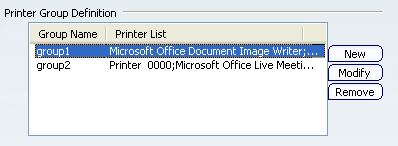
-
You can then carry out the following actions on the created groups:
- modification: select a group then click Modify. This opens the Printer Group dialog box detailed above and you can then add or remove printers
- removal: select a group then click Remove to remove it from the group list.
When printer groups have been defined, you can use them to filter the printers displayed in the Print dialog box using a specific combo box.